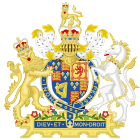Clergy Act 1661 facts for kids
| Act of Parliament | |

|
|
| Long title | An Act for Repeal of an Act of Parliament Entituled "An Act for disenabling all persons in Holy Orders to exercise any Temporall Jurisdiccion or Authority." |
|---|---|
| Citation | 13 Cha. 2 St. 1. c. 2 |
| Dates | |
| Royal assent | 30 July 1661 |
| Commencement | 8 May 1661 |
| Other legislation | |
| Repeals/revokes | Clergy Act 1640 |
| Repealed by | Statute Law Revision Act 1863 |
|
Status: Repealed
|
|
| Text of statute as originally enacted | |
The Clergy Act 1661 was a law passed by the Parliament of England in 1661. This important law cancelled an older law from 1640. The older law had stopped people in holy orders (like bishops and priests) from holding any government or non-religious positions of power. Because of the 1640 law, bishops were removed from the House of Lords, which is part of the Parliament. The 1661 Act changed this, allowing them to return. This Act itself was later cancelled in 1863 by another law called the Statute Law Revision Act 1863.
Contents
What Was the Clergy Act 1661?
The Clergy Act 1661 was a special law made in England. It was created by the Parliament of England, which was the main group that made laws for the country at that time. The Act's main goal was to undo a previous law. This older law had caused a lot of changes in how the government worked.
Why Was This Act Needed?
To understand the 1661 Act, we need to look at what happened before. In 1640, another law was passed, called the Clergy Act 1640. This 1640 Act said that people in "holy orders" could not have any "temporal jurisdiction or authority."
What Does "Holy Orders" Mean?
"Holy orders" refers to people who are part of the church, like bishops, priests, or ministers. They have religious duties.
What Does "Temporal Jurisdiction or Authority" Mean?
"Temporal jurisdiction or authority" means power or control over things that are not religious. This includes government jobs, legal roles, or positions in the country's administration. So, the 1640 Act stopped church leaders from being involved in these non-religious parts of government.
What Happened Because of the 1640 Act?
One big effect of the 1640 Act was that bishops were removed from the House of Lords. The House of Lords is one of the two main parts of the English Parliament. Bishops who sat there were known as "Lords Spiritual." They had been an important part of the Parliament for a long time. Removing them changed the balance of power in the government.
What Did the 1661 Act Change?
The Clergy Act 1661 "repealed, annulled and made void" the 1640 Act. This means it completely cancelled and wiped out the older law. By doing this, the 1661 Act allowed people in holy orders to once again hold positions of non-religious power. Most importantly, it meant that bishops, the Lords Spiritual, could return to their seats in the House of Lords. This was a big step in restoring the traditional structure of the English Parliament after a period of major political change.
When Was the Act Repealed?
The Clergy Act 1661 stayed in effect for many years. However, it was eventually cancelled itself. This happened in 1863, when the Statute Law Revision Act 1863 was passed. This later Act was part of an effort to tidy up and remove old, outdated laws from the books. So, while the 1661 Act was important for its time, it is no longer a law today.
 | Georgia Louise Harris Brown |
 | Julian Abele |
 | Norma Merrick Sklarek |
 | William Sidney Pittman |

